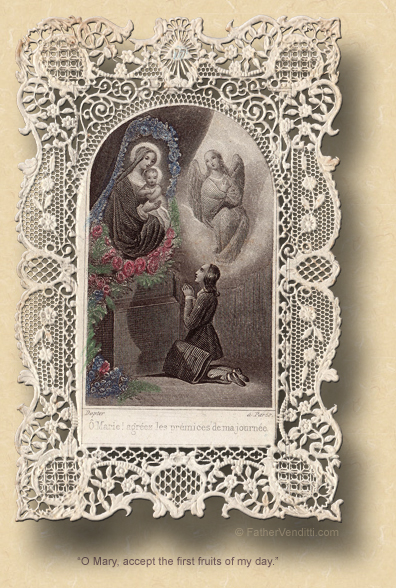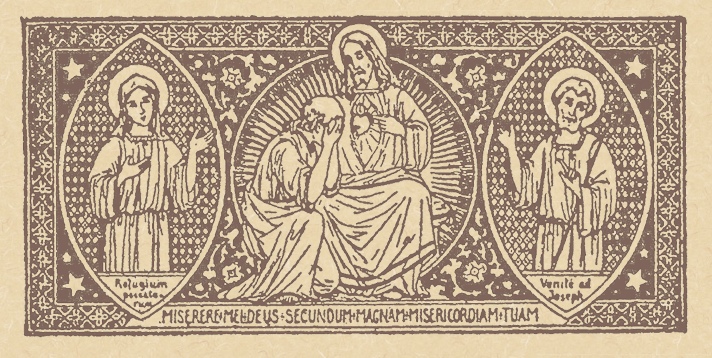What Is this Unforgivable Sin?
In the United States:
The Twenty-Eighth Saturday of Ordinary Time; or, the Memorial of Saints John de Bréfeuf & Isaac Jogues, Priests, and Their Companions.*
Lessons from the primary feria, according to the ordinary form of the Roman Rite:
• Romans 4: 13, 16-18.
• Psalm 105: 6-9, 42-43.
• Luke 12: 8-12.
|
When a Mass for the memorial is taken, lessons from the feria as above, or from the proper:
• II Corinthians 4: 7-15.
• Psalm 126: 1-6.
• Matthew 28: 16-20.
…or, any lessons from the common of Martyrs for Missionary Martyrs.
|
|
Outside the United States:
The Twenty-Eighth Saturday of Ordinary Time; or, the Saturday Memorial of the Blessed Virgin Mary.
Lessons from the feria as above; or, when a Mass for the memorial is taken, from the feria or any lessons from the common of the Blessed Virgin Mary.
|
The Third Class Feast of Saint Peter of Alcantara, Confessor.**
First lesson from the proper, the rest from the common "Justus ut palma..." of of a Confessor not a Bishop, according to the extraordinary form of the Roman Rite:
• Philippians 3: 7-12.
• Psalm 36: 30-31.
• Luke 12: 32-34.
FatherVenditti.com
|
 8:31 PM 10/19/2019 — In today's Gospel lesson we find some remarkably strong words, even for our Lord: “Everyone who speaks a word against the Son of Man will be forgiven, but the one who blasphemes against the Holy Spirit will not be forgiven” (Luke 12: 10 NABRE). Saint Mark, too, recounts this rebuke, reporting our Lord as saying that this blasphemy can never be forgiven, and that the one who offends in this way is guilty of an eternal sin (cf. 3: 29). 8:31 PM 10/19/2019 — In today's Gospel lesson we find some remarkably strong words, even for our Lord: “Everyone who speaks a word against the Son of Man will be forgiven, but the one who blasphemes against the Holy Spirit will not be forgiven” (Luke 12: 10 NABRE). Saint Mark, too, recounts this rebuke, reporting our Lord as saying that this blasphemy can never be forgiven, and that the one who offends in this way is guilty of an eternal sin (cf. 3: 29).
Nevertheless, many people get confused about what exactly the sin against the Holy Spirit is. I've heard all kinds of weird explanations from people who have it completely wrong; but, we can turn to Saint Matthew for a clearer explanation, as he quotes these words of our Lord in a context that allows for a better understanding of them. He tells us that people were astonished at Christ's miracles, so much so that they wondered if whether He was able to do these things because He was in league with the Devil: “This man drives out demons only by the power of Beelzebul, the prince of demons” (Matt. 12: 24 NABRE); and, here is where we find the unforgivable nature of this particular blasphemy: that it denies the very source of forgiveness itself. All sins can be forgiven, no matter how serious they may be, because God's mercy is infinite; but, there is a requirement: in order to be forgiven, the sinner must recognize his sin and believe in the mercy of God. In other words, we can't be forgiven of our sins if we refuse to recognize that we've committed any. This is the hardness of heart that impedes the forgiveness of our sins, and it's as simple as that. And we know this instinctively: that's why the Act of Contrition that we say in confession is worded the way it is.
It happens very rarely, but once in a great while a priest will encounter someone in confession who will confess something of a mortally sinful nature, but without an expression of true contrition: “I had an abortion, but I had no choice; I had to do it.” Well, no, you didn't have to do it; there was always a choice to accept the consequences of doing the right thing, no matter how much that would require you to alter your life; and, usually, the priest is able to bring that person to some sort of minimal semblance of regret which will qualify as contrition and a purpose of amendment, allowing him to give absolution, leaving the rest in the hands of God. And most priests, thank God, will go through their whole lives never having to refuse absolution. But I have twice in my life been in a situation in confession where I could not absolve someone because I could not elicit from the penitent even a token acknowledgment that anything wrong was done, or that there was any regret at all in having done it. Some have argued that if something is mentioned in confession at all, it means that somewhere, deep down inside, there's some sort of regret that would qualify as contrition; and, on a psychological level that might be true, but it has to be spoken out loud.
Pope Saint John Paul II spoke of the seriousness of this matter, and warned us in his encyclical Dominum et vivificantem (May 18, 1986):
Blasphemy against the Holy Spirit, then, is the sin committed by the person who claims to have a “right” to persist in evil—in any sin at all—and who thus rejects Redemption. One closes oneself up in sin, thus making impossible one's conversion, and consequently the remission of sins, which one considers not essential or not important for one's life.
In other words, the “sin against the Holy Spirit” is not a specific sin, it can be any sin; and, it's not unforgivable because of its seriousness, but because of its very nature: it cannot be forgiven because the very idea of forgiveness itself has been rejected. Or, to put it in plain, idiot language: we can't be forgiven for doing something wrong if we don't recognize that what we did was wrong. The unforgivable sin is the sin of not seeking forgiveness, which we can't do if we don't believe we've sinned.
It's very rare. As I said, almost everyone who walks into a confessional is there because he's done something he knows is wrong and wants our Lord's pardon; but, it highlights the importance of making a good examination of conscience every day, so that we can attune ourselves to recognize our sins, even our little venial sins. That's why frequent confession is the secret to spiritual perfection: the more we examine our consciences, the more we have to confess, not because we've sinned more, but because we're able to recognize things that we wouldn't have recognized as sins before.
That's why this Gospel lesson is given us to hear on a Saturday, a day on which most of us were formed, in our youth, to go to confession. So, let's take the opportunity of this Holy Mass to rededicate ourselves to frequent confession which, combined with the worthy reception of Holy Communion, is the surest way to ensure that we remain always in our Lord's grace.

* These eight Jesuit missionaries were sent from France to North America. Brébeuf (1593-1649) and Jogues (1607-1646) were martyred after converting many thousands of Native Americans.
** A Spaniard of noble birth, Alcantara entered the Order of St. Francis at the age of 16. He re-established the primitive Franciscan rule, and supported St. Teresa in her work to reform the Carmelites. He died in 1562.
|

